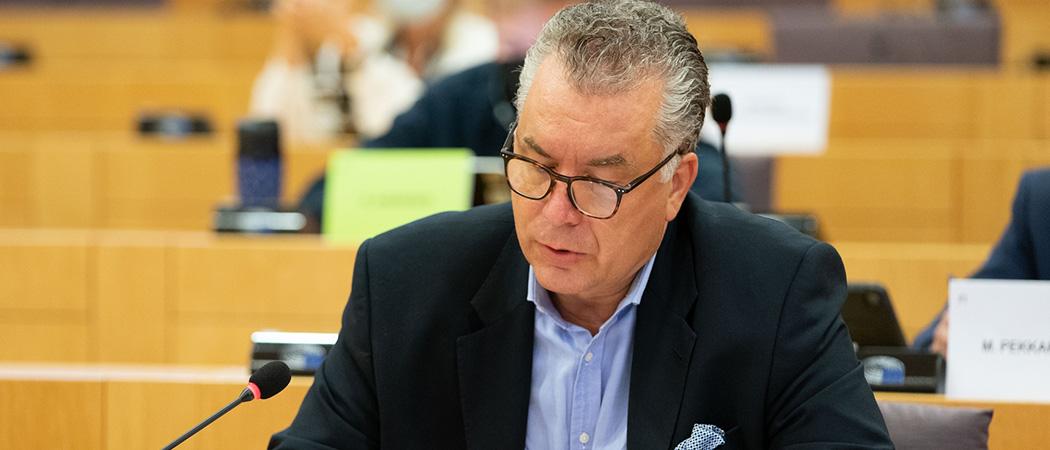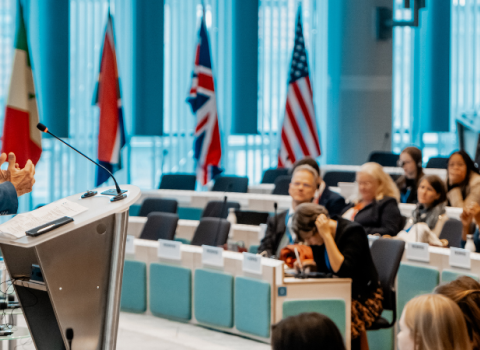MEPS are trying to block a proposed €316M cut to next year’s R&D budget. EU climate targets will be impossible to achieve if member states keep delaying investments in R&D, they say

Christian Ehler, Member of the European Parliament. Photo : European Union
The European Parliament wants member states to stop a proposed €316 million cut to the 2022 Horizon Europe budget, with German MEP and Horizon Europe budget rapporteur Christian Ehler saying it would be “nothing less than a scandal.”
The EU won’t be able to achieve its 2030 decarbonisation targets if member states keep delaying investments in research and the development of new technologies needed to make Europe’s industry less polluting, Ehler told a meeting of the industry and research committee (ITRE) today, as he decried the Council’s approach to any budget debate.
Earlier this year, member states said the EU should focus on spending the pandemic recovery fund first and backload money from the multiannual EU budget to the end of Horizon Europe, which will run until 2027.
Brussels insiders call this the budgetary waltz, a back and forth between the Commission, Council and Parliament, which inevitably ends with a compromise that sees cuts to research programmes, despite Parliament pushback.
Back in June, the European Commission proposed spending nearly €12.2 billion from the seven-year research and innovation programme during 2022, but member states argued there was not enough demand for this level investment. No final decision can be made without Parliament’s approval.
The dispute mirrors last year’s battle over the seven-year budget of Horizon Europe, when member states slashed funding despite Parliament’s demand it be increased to €120 billion. Last December, after months of impasse and just a few weeks before the programme was due to start, a budget of €95.5 billion was agreed.
Ehler, who was instrumental in the battle, criticised member states for a lack of vision. “Every year the Council tries to cut down [research and innovation] because that's the low level compromise, then the Parliament fights back,” he said.
Uphill battle
Ehler said that reducing carbon dioxide emissions by 55% in the next nine years will require an overhaul of the transport sector and a radical transformation of EU industry. He has also warned that the EU is falling behind the US and China in terms of R&D investments.
“The Americans have announced the biggest civilian research programme in the history of the United States; China is raising R&D expenditure in a state driven economy, where there is a close interaction between the state and the private sector,” said Ehler.
MEPs pledged to work together to roll back the cuts put forward by the EU Council.
“Research and innovation programmes must have adequate funding,” said French MEP Valerie Hayer, while Rasmus Andresen of the European Green Party said the 2022 budget negotiations will be “an uphill battle against the member states.”
“We need strong research and development on our route to decarbonize the economy and to benefit from strong technological innovation,” said Henrike Hahn of the Greens–European Free Alliance.
Member states also want budgets for Digital Europe and InvestEU to shrink by €50 million and €45.5 million, respectively. The total cuts proposed for 2022 are €1.4 billion less than the Commission’s proposal.
All this has an effect on how many research projects will be funded next year. The 2021-2022 Horizon Europe work programmes, outlining the calls, their scope, budget and deadlines, were published in June. However, the final funding allocated to each call is subject to the Council and the Parliament’s final decision.
The 2022 budget will be negotiated between the member states and the Parliament, with the deal requiring the endorsement of the majority of member states and the final green light from the MEPs. If no deal is reached in the next few months, the Commission will present a new draft annual budget, a process that could drag on into 2022.





 A unique international forum for public research organisations and companies to connect their external engagement with strategic interests around their R&D system.
A unique international forum for public research organisations and companies to connect their external engagement with strategic interests around their R&D system.